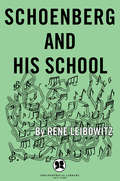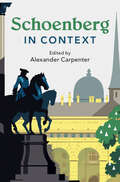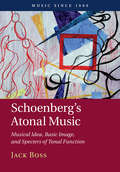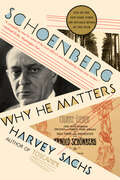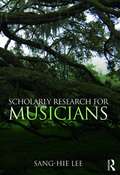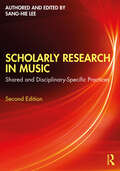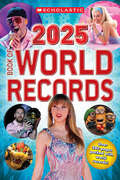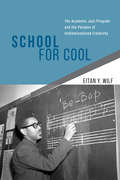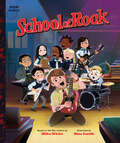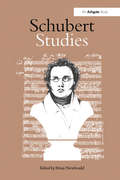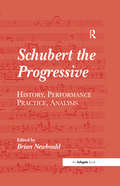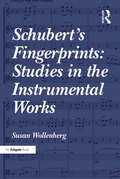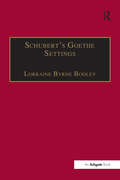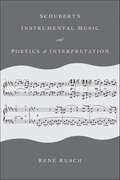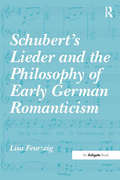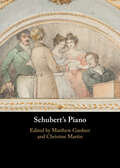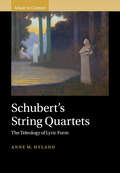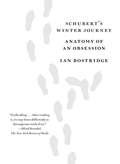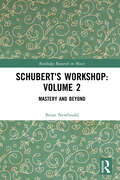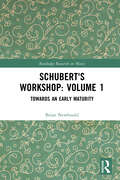- Table View
- List View
Schoenberg and his School
by Rene LeibowitzThis book talks about music. It incorporates modal and tonal music. It talks about Arnold Schoenberg, the founder of contemporary music, Alban Berg and how the past plays on contemporary music and Anton Webern and the future of contemporary music. As well as the structure of contemporary musical speech. Ren Leibowitz was a French composer, conductor, music theorist and teacher born in Warsaw, Poland. During the early 1930s, Leibowitz studied composition and orchestration with Ravel in Paris, where he was introduced to Schoenberg's Twelve-note technique by the German pianist and composer Erich Itor Kahn. He subsequently studied with Schoenberg's pupil Webern. Many of the works of the Second Viennese School were first heard in France at the International Festival of Chamber Music established by Leibowitz in Paris in 1947. Leibowitz was highly influential in establishing the reputation of the Second Viennese School, both through activity as a teacher in Paris after WWII and through his book Schoenberg et son ecole, published in 1947 and translated by Dika Newlin as Schoenberg and his School (US and UK editions 1949). This was among the earliest theoretical treatises written on Schoenberg's 12-tone method of composition. Leibowitz's advocacy of the Schoenberg school was taken further by his two most gifted pupils, each taking different paths in promoting the musics of Schoenberg, Webern and the development of serialism, namely Pierre Boulez and Jacques-Louis Monod. His American students include the composers Will Ogdon, Janet Maguire, and the avant-garde film director-animator John Whitney. As conductor, Leibowitz was active in many recording projects. One of the most widely circulated and most notable is a set of the Beethoven symphonies made for Reader's Digest Recordings; it was apparently the first recording of the symphonies to follow Beethoven's original metronome markings. In choosing this approach, Leibowitz was influenced by his friend and colleague Rudolf Kolisch. Leibowitz likewise made many recordings for Reader's Digest in their various compilation albums. He also wrote for Les Temps modernes, applying existentialist ideas to musicology.
Schoenberg in Context (Composers in Context)
by Alexander CarpenterContradictory and paradoxical, Schoenberg was responsible for explosively radical innovations in composition - including atonality and the twelve-tone method - that changed the face of music in the twentieth century. This volume explores Schoenberg's life, work and world, offering contributions from internationally recognized musicologists, music theorists, cultural historians, literary scholars and more. Chapters examine the different places where Schoenberg lived, his various approaches to composition, the people and institutions that shaped his life and work, and the big issues and ideas that informed his worldview, including religion, gender, technology and politics. This book is essential for students and educators but also accessible to a general audience interested in the intersections of music, modernity, society and culture, offering a variety of fresh, multi-disciplinary perspectives on Schoenberg and his richly variegated world.
Schoenberg's Atonal Music: Musical Idea, Basic Image, and Specters of Tonal Function (Music since 1900)
by Jack BossAward-winning author Jack Boss returns with the 'prequel' to Schoenberg's Twelve-Tone Music (Cambridge, 2014) demonstrating that the term 'atonal' is meaningful in describing Schoenberg's music from 1908 to 1921. This book shows how Schoenberg's atonal music can be understood in terms of successions of pitch and rhythmic motives and pitch-class sets that flesh out the large frameworks of 'musical idea' and 'basic image'. It also explains how tonality, after losing its structural role in Schoenberg's music after 1908, begins to re-appear not long after as an occasional expressive device. Like its predecessor, Schoenberg's Atonal Music contains close readings of representative works, including the Op. 11 and Op. 19 Piano Pieces, the Op. 15 George-Lieder, the monodrama Erwartung, and Pierrot lunaire. These analyses are illustrated by richly detailed musical examples, revealing the underlying logic of some of Schoenberg's most difficult pieces of music.
Schoenberg's Twelve-Tone Music
by Jack BossJack Boss takes a unique approach to analyzing Arnold Schoenberg's twelve-tone music, adapting the composer's notion of a 'musical idea' - problem, elaboration, solution - as a framework and focusing on the large-scale coherence of the whole piece. The book begins by defining 'musical idea' as a large, overarching process involving conflict between musical elements or situations, elaboration of that conflict, and resolution, and examines how such conflicts often involve symmetrical pitch and interval shapes that are obscured in some way. Containing close analytical readings of a large number of Schoenberg's key twelve-tone works, including Moses und Aron, the Suite for Piano Op. 25, the Fourth Quartet, and the String Trio, the study provides the reader with a clearer understanding of this still-controversial, challenging, but vitally important modernist composer.
Schoenberg: Why He Matters
by Harvey SachsA NEW YORK TIMES NOTABLE BOOK OF 2023 A New Yorker Best Book of the Year “[A]n immensely valuable source for anyone desiring an accessible overview of this endlessly controversial and chronically misunderstood giant of 20th-century music.” —John Adams, New York Times Book Review, cover review An astonishingly lyrical biography that rescues Schoenberg from notoriety, restoring him to his rightful place in the pantheon of twentieth-century composers. In his time, the Austrian American composer Arnold Schoenberg (1874–1951) was an international icon. His twelve-tone system was considered the future of music itself. Today, however, leading orchestras rarely play his works, and his name is met with apathy, if not antipathy. With this interpretative account, the acclaimed biographer of Toscanini finally restores Schoenberg to his rightful place in the canon, revealing him as one of the twentieth century’s most influential composers and teachers. Sachs shows how Schoenberg, a thorny character who composed thorny works, raged against the “Procrustean bed” of tradition. Defying his critics—among them the Nazis, who described his music as “degenerate”—he constantly battled the anti-Semitism that eventually precipitated his flight from Europe to Los Angeles. Yet Schoenberg, synthesizing Wagnerian excess with Brahmsian restraint, created a shock wave that never quite subsided, and, as Sachs powerfully argues, his compositions must be confronted by anyone interested in the past, present, or future of Western music.
Scholarly Research for Musicians
by Sang-Hie LeeScholarly Research for Musicians presents a range of research methods and techniques, incorporating both the common elements of traditional music research methodologies with innovative research strategies endemic to the fields of social science, education, and performance science. The author’s collaborative and interdisciplinary approach reinforces the belief that research is most palpable and successful when accessed through a relevant and meaningful way of organizing thoughts and knowledge. Drawing from over twenty years of classroom experience, the author organizes the text into five units: Common Bases, Qualitative Research, Quantitative Research, Performance Science, and Review. Research is presented as an accessible process, one facilitated by brainstorming and question-asking, the systematic collection of information, and the analysis and synthesis of information—all with the aim to develop a succinct conceptual framework. In explicating this process, the author introduces traditional Western thought alongside contemporary and Eastern philosophy. Experts in the field of performance science explore novel approaches to studying the audience, incorporating various measuring devices and methods. In the final chapter, the author offers strategies for disseminating and publishing research reports. Scholarly Research for Musicians demystifies the research process for musicians and music students alike, demonstrating the common principles of cohesive research plans. PowerPoint presentations are available to instructors, covering chapter discussion points in summary format. This text explores interdisciplinary methods that merge with and focus on the study of music while emphasizing concepts and materials relevant to all types of research.
Scholarly Research in Music: Shared and Disciplinary-Specific Practices
by Sang-Hie LeeScholarly Research in Music: Shared and Disciplinary-Specific Practices, Second Edition offers a comprehensive and detailed guide to engaging in research in all disciplines of music. This second edition continues to provide the foundational principles of research for all musicians, including performers, theorists, composers, conductors, music educators, and musicologists. It strengthens the core pedagogical framework of the first edition by offering updated guidance on available technologies, methodologies, and materials. Driven by the rapidly shifting research paradigms within music, sixteen contributors expand the already broad scope of the book, with new chapters on research in today’s library, neurophenomenology in music, and self-efficacy in music performance, as well as new sections in chapters on philosophy, historical research, social science research, and statistics. Introducing research as a friendly and accessible process, the book engages students in brainstorming a topic, asking pertinent questions, systematically collecting relevant information, analyzing and synthesizing the information, and designing a cohesive research plan to conduct original research. Detailing the methodologies and techniques of both conventional and innovative approaches to music research, Scholarly Research in Music provides an essential grounding for all kinds of music researchers.
Scholastic Book of World Records 2025
by ScholasticIt's another incredible year for world records, social media sensations, and pop-culture trends! This must-have guide to 2025 covers everything from science, tech, sports, music, movies, animals, and more.What is the most popular dog breed?What is the most successful movie of all time?Which NBA player was the youngest to reach 30,000 points?This book is packed with the answers to these questions and MORE! Read all about the biggest, best, and most buzzworthy world records in music, movies, sports, technology, video games, science, nature, states, and animals.
School for Cool: The Academic Jazz Program and the Paradox of Institutionalized Creativity
by Eitan Y. WilfJazz was born on the streets, grew up in the clubs, and will die--so some fear--at the university. Facing dwindling commercial demand and the gradual disappearance of venues, many aspiring jazz musicians today learn their craft, and find their careers, in one of the many academic programs that now offer jazz degrees. School for Cool is their story. Going inside the halls of two of the most prestigious jazz schools around--at Berklee College of Music in Boston and the New School for Jazz and Contemporary Music in New York--Eitan Y. Wilf tackles a formidable question at the heart of jazz today: can creativity survive institutionalization? Few art forms epitomize the anti-institutional image more than jazz, but it’s precisely at the academy where jazz is now flourishing. This shift has introduced numerous challenges and contradictions to the music’s practitioners. Solos are transcribed, technique is standardized, and the whole endeavor is plastered with the label "high art”--a far cry from its freewheeling days. Wilf shows how students, educators, and administrators have attempted to meet these challenges with an inventive spirit and a robust drive to preserve--and foster--what they consider to be jazz’s central attributes: its charisma and unexpectedness. He also highlights the unintended consequences of their efforts to do so. Ultimately, he argues, the gap between creative practice and institutionalized schooling, although real, is often the product of our efforts to close it.
School for Cool: The Academic Jazz Program and the Paradox of Institutionalized Creativity
by Eitan Y. WilfJazz was born on the streets, grew up in the clubs, and will die—so some fear—at the university. Facing dwindling commercial demand and the gradual disappearance of venues, many aspiring jazz musicians today learn their craft, and find their careers, in one of the many academic programs that now offer jazz degrees. School for Cool is their story. Going inside the halls of two of the most prestigious jazz schools around—at Berklee College of Music in Boston and the New School for Jazz and Contemporary Music in New York—Eitan Y. Wilf tackles a formidable question at the heart of jazz today: can creativity survive institutionalization? Few art forms epitomize the anti-institutional image more than jazz, but it’s precisely at the academy where jazz is now flourishing. This shift has introduced numerous challenges and contradictions to the music’s practitioners. Solos are transcribed, technique is standardized, and the whole endeavor is plastered with the label “high art”—a far cry from its freewheeling days. Wilf shows how students, educators, and administrators have attempted to meet these challenges with an inventive spirit and a robust drive to preserve—and foster—what they consider to be jazz’s central attributes: its charisma and unexpectedness. He also highlights the unintended consequences of their efforts to do so. Ultimately, he argues, the gap between creative practice and institutionalized schooling, although real, is often the product of our efforts to close it.
School of Rock: The Classic Illustrated Storybook (Pop Classics #10)
by Kim SmithFor those about to read . . . we salute you! The zany and much-beloved comedy-musical film about pint-sized rockers sticking it to the man is now an adorable picture book! It&’s just another ordinary day at Horace Green Prep School, and the students think they&’re getting just another ordinary substitute teacher. Instead, Dewey Finn, a washed-up musician with dreams of greatness, whisks them away on a totally rocking adventure. After Dewey hears the kids practicing in music class, he discovers how talented they are and realizes he has another chance at his greatest dream: winning the Battle of the Bands. But when the parents discover what Dewey has been teaching their kids, will the School of Rock even be able to compete?With all the iconic moments and laugh-out-loud lines from the film included, the book's charm and spirit shines on every page. This delightful story of a diverse and passionate group of children coming into their own is a must-have for fans of the film, parents of musical kids, and anyone who&’s ever stuck it to the man!
Schubert Studies: A New Perspective (Symphonic Studies #Volume 1)
by Brian NewbouldSchubert Studies comprises eleven essays by renowned Schubert scholars and performers. The volume sheds light on certain aspects of Schubert‘s music and biography which have hitherto remained relatively neglected, or which warrant further investigation. Musical topics include analyses of tempo conventions, transitional procedures and rhythmic organization. There are reassessments of several works, using autograph research, performing experience and other approaches; while assumptions as to the extent of Schubert‘s influence on later Czech composers are also brought into question. Concerns with aspects of Schubert‘s biography, in particular the social and musical circles in which he moved, come under examination in several essays. The final two chapters deal specifically with the composer‘s relationships with women, and the psychological and physiological illnesses from which he suffered. Each of the essays here charts new and existing evidence to provide fresh perspectives on these aspects of Schubert‘s life and music, making this volume an indispensable tool for scholars concerned with his work.
Schubert the Progressive: History, Performance Practice, Analysis
by Brian NewbouldThe eleven essays that comprise this volume represent some of the most significant strands of current Schubert research. Arising from an international conference organized by the Schubert Institute (UK) and the University of Leeds in 2000, the emphasis of the papers is on issues of performance practice, analysis and hermeneutics. In the opening essay of the book, Charles Rosen illuminates some of Schubert's compositional practices and their implications for performers. Further performance problems are explored by Walther D rr who highlights the paradox between Schubert's precise notation of pitches and rhythm and his imprecision in relation to dynamics and articulation. As Roy Howat makes clear in his essay, the performer needs to read between the lines of even the best Schubert editions.Aspects of Schubert's style are explored in other essays. Clive McClelland discusses the composer's use of ombra style, while Brian Newbould examines Schubert's techniques of compression and expansion as illustrated in his dances and in sonata movements. Robert Hatten explores the G major Piano Sonata as pastoral, and James Sobaskie and Nicholas Rast provide complementary analyses of the A minor Quartet.The organization of musical time in Schubert and his relationship in this regard to later composers is the subject of Susanne Kogler's essay, while Walburga Litschauer discusses Schubert's early piano sonatas and previously unknown versions of them. Various enigmas surrounding Schubert's life and music are discussed by Roger Neighbour.With contributions from both internationally acclaimed and younger scholars, this volume represents a further step in the multifaceted direction that Schubert research is taking.
Schubert's Beethoven Project
by John M. GingerichWhy couldn't Schubert get his 'great' C-Major Symphony performed? Why was he the first composer to consistently write four movements for his piano sonatas? Since neither Schubert's nor Beethoven's piano sonatas were ever performed in public, who did hear them? Addressing these questions and many others, John M. Gingerich provides a new understanding of Schubert's career and his relationship to Beethoven. Placing the genres of string quartet, symphony, and piano sonata within the cultural context of the 1820s, the book examines how Schubert was building on Beethoven's legacy. Gingerich brings new understandings of how Schubert tried to shape his career to bear on new hermeneutic readings of the works from 1824 to 1828 that share musical and extra-musical pre-occupations, centering on the 'Death and the Maiden' Quartet and the Cello Quintet, as well as on analyses of the A-minor Quartet, the Octet, and of the 'great' C-Major Symphony.
Schubert's Fingerprints: Studies In The Instrumental Works
by Susan WollenbergAs Robert Schumann put it, 'Only few works are as clearly stamped with their author's imprint as his'. This book explores Schubert's stylistic traits in a series of chapters each discussing an individual 'fingerprint' with case studies drawn principally from the piano and chamber music. The notion of Schubert's compositional fingerprints has not previously formed the subject of a book-length study. The features of his personal style considered here include musical manifestations of Schubert's 'violent nature', the characteristics of his thematic material, and the signs of his 'classicizing' manner. In the process of the discussion, attention is given to matters of form, texture, harmony and gesture in a range of works, with regard to the various 'fingerprints' identified in each chapter. The repertoire discussed includes the late string quartets, the String Quintet, the E flat Piano Trio and the last three piano sonatas. Developing ideas which she first proposed in a series of journal articles and contributions to symposia on Schubert, Professor Wollenberg takes into account recent literature by other scholars and draws together her own researches to present her view of Schubert's 'compositional personality'. Schubert emerges as someone exerting intellectual control over his musical material and imbuing it with poetic resonance.
Schubert's Goethe Settings
by LorraineByrne BodleyThe traditional approach to the study of Goethe and Schubert is to place them in opposition to one another, both in terms of their life experiences and in relation to the nineteenth-century Lied. In her introduction to this book, Lorraine Byrne examines the myths that have evolved around these artists and challenges the view that Goethe was unmusical and conservative in his musical tastes. She also considers Schubert's life in relation to his obvious affinity with the poet and links the composer's Goethe settings with the poet's perception of the Lied. Goethe judged the success of a setting by whether the meaning of the text had been realised in musical form. In his Goethe settings Schubert translates the poet's meaning into musical terms and his rendition attains the classical unity of words and music that Goethe sought. The core of this volume is the series of individual analyses of all of Schubert's solo, dramatic and multi-voice settings of Goethe texts. These explore in detail both the literary and the musical dimensions of each work, and Schubert's reading and interpretation of Goethe's writings. This is the first study in English to treat both artists with equal attention and insight. This, together with its encyclopaedic coverage of this important corpus of works, makes this volume an essential reference tool for all those who study Schubert and Goethe.
Schubert's Instrumental Music and Poetics of Interpretation
by René RuschMusic scholarship's views of Franz Schubert's instrumental works continue to evolve. How might aesthetic values, historiographies, revisions to the composer's biography, and disciplinary commitments affect how we interpret his music?Schubert's Instrumental Music and Poetics of Interpretation explores the aesthetic positions and operations that underlie critical assessments of Schubert's instrumental works. In six chapters, each devoted to one or two of Schubert's pieces, René Rusch examines the conditions that have prompted scholarship to reevaluate the composer's music and legacy, considers how different conclusions about his music may be reflective of certain aesthetic values, investigates the role of narrative in both music analysis and constructions of history, and explores alternative forms of coherence through updated analyses of the composer's instrumental works. Rusch's observations and comparative analyses address four significant areas of scholarly focus in Schubert studies, including his approach to chromaticism, his unique musical forms, the relationship between his music and biography, and the influence of Beethoven.Drawing from a range of philosophical, hermeneutic, historical, biographical, theoretical, and analytical sources, Schubert's Instrumental Music and Poetics of Interpretation offers readers a unique and innovative foray into the poetics of contemporary analyses of Schubert's instrumental music and develops new ways to engage with his repertoire.
Schubert's Late Music
by Julian Horton Bodley, Lorraine Byrne and Horton, Julian Lorraine Byrne BodleySchubert's late music has proved pivotal for the development of diverse fields of musical scholarship, from biography and music history to the theory of harmony. This collection addresses current issues in Schubert studies including compositional technique, the topical issue of 'late' style, tonal strategy and form in the composer's instrumental music, and musical readings of the 'postmodern' Schubert. Offering fresh approaches to Schubert's instrumental and vocal works and their reception, this book argues that the music that the composer produced from 1822–8 is central to a paradigm shift in the history of music during the nineteenth century. The contributors provide a timely reassessment of Schubert's legacy, assembling a portrait of the composer that is very different from the sentimental Schubert permeating nineteenth-century culture and the postmodern Schubert of more recent literature.
Schubert's Lieder and the Philosophy of Early German Romanticism
by Lisa FeurzeigThis study of Franz Schubert's settings of poetry by Friedrich Schlegel and Novalis introduces the fascinating world of early German Romanticism in the 1790s, when an energetic group of bold young thinkers radically changed the landscape of European thought. Schubert's encounters with early Romantic poetry some twenty years later reanimated some of the movement's central ideas. Schubert set eleven texts from Schlegel's Abendröte poetic cycle and six poems drawn from Novalis' religious and erotic poetry. Through detailed analyses of how various musical structures in these songs mirror and sometimes even explicate the central ideas of the poems, this book argues that Schubert was an abstract thinker who used his medium of music to diagram the complex ideas of a highly intellectual movement. A comparison is made to the hermeneutic theory of that time, primarily that of Schleiermacher, who was himself linked to the early Romantics. Through exploration of ideas such as Schlegel's representation of the necessary interdependence of part and whole and Novalis' strong association of religious and erotic experience, along with their musical representations by Schubert, this book opens an intriguing world of thought for modern readers. At the same time, Feurzeig explores some of Schubert's little-known songs, which range from quirky to charming to exquisite.
Schubert's Piano
by Christine Martin Matthew GardnerThe piano features prominently in Schubert's musical output throughout his career, not only as an instrument for solo piano pieces (for two and four hands), but also in Lieder and chamber music as an equal partner to the voice or other instruments. His preference for the instrument is reflected in contemporary reports by his friends and colleagues as well as in iconography, where he is frequently depicted at the piano. In early nineteenth-century Vienna the piano underwent a rapid period of development, allowing composers to experiment with expanded ranges, sonorities and effects that differ substantially from modern concert grands. Schubert's Piano considers the composer's engagement with this instrument in terms of social history, performance and performance practices, aesthetics, sonority and musical imagery, and his approaches to composition across several musical genres, stimulating new insights into the creative interplay among Schubert's piano compositions.
Schubert's Songs: A Biographical Study
by Dietrich Fischer-DieskauIn this book Dietrich Fischer-Dieskau, one of the greatest interpreters of German Lieder, conducts a masterly study of the genesis and development of Schubert's music, revealed in terms of the composer's own life and growth to psychological maturity. Of the six hundred and eight Lieder that Schubert composed during his brief life, only a very small proportion was widely known until Dietrich Fischer-Dieskau recorded three volumes of them and began to introduce the neglected ones into his concert programs. This book sets the songs against the background of the composer's life in Vienna, revealing the relevance of his Lieder to the age he lived in. With the outstanding musicianship and complete sincerity that are the hallmarks of his art, the author discusses the brilliance and diversity of the Lieder settings, from the simple strophic to the "through composed" song and the great song cycles; and he deals in detail with the texts, which range from those by Goethe and Shakespeare to the often indifferent verses of the composer's friends. For singers and accompanists, professional and amateur musicians, record enthusiasts, and concert-goers everywhere, this is a book of inestimable value--by a great musician--about one of the greatest musicians of all time. Probably the best-known baritone in the Western world, Dietrich Fischer-Dieskau was born in Germany in 1925. Since the beginning of his career in post-World War II Germany, his influence on singers and singing has been enormous. Renowned for his performances of the songs of Schubert, Brahms, Schumann, Beethoven, Mozart, Verdi, and Wagner, he is acclaimed by musicians and critics as one of the supreme artists of our time.
Schubert's String Quartets: The Teleology of Lyric Form (Music in Context)
by Anne HylandFranz Schubert's music has long been celebrated for its lyrical melodies, 'heavenly length' and daring harmonic language. In this new study of Schubert's complete string quartets, Anne Hyland challenges the influential but under-explored claim that Schubert could not successfully incorporate the lyric style into his sonatas, and offers a novel perspective on lyric form that embraces historical musicology, philosophy and music theory and analysis. Her exploration of the quartets reveals Schubert's development of a lyrically conceived teleology, bringing musical form, expression and temporality together in the service of fresh intellectual engagement. Her formal analyses grant special focus to the quartets of 1810–16, isolating the questions they pose for existing music theory and employing these as a means of scrutinising the relationship between the concepts of lyricism, development, closure and teleology thereby opening up space for these works to challenge some of the discourses that have historically beset them.
Schubert's Winter Journey
by Ian BostridgeAn exploration of the world's most famous and challenging song cycle, Schubert's Winter Journey (Winterreise), by a leading interpreter of the work, who teases out the themes--literary, historical, psychological--that weave through the twenty-four songs that make up this legendary masterpiece.Completed in the last months of the young Schubert's life, Winterreise has come to be considered the single greatest piece of music in the history of Lieder. Deceptively laconic--these twenty-four short poems set to music for voice and piano are performed uninterrupted in little more than an hour--it nonetheless has an emotional depth and power that no music of its kind has ever equaled. A young man, rejected by his beloved, leaves the house where he has been living and walks out into snow and darkness. As he wanders away from the village and into the empty countryside, he experiences a cascade of emotions--loss, grief, anger, and acute loneliness, shot through with only fleeting moments of hope--until the landscape he inhabits becomes one of alienation and despair. Originally intended to be sung to an intimate gathering, performances of Winterreise now pack the greatest concert halls around the world. Drawing equally on his vast experience performing this work (he has sung it more than one hundred times), on his musical knowledge, and on his training as a scholar, Bostridge teases out the enigmas and subtle meanings of each of the twenty-four lyrics to explore for us the world Schubert inhabited, his biography and psychological makeup, the historical and political pressures within which he became one of the world's greatest composers, and the continuing resonances and affinities that our ears still detect today, making Schubert's wanderer our mirror.From the Hardcover edition.
Schubert's Workshop: Mastery and Beyond (Routledge Research in Music)
by Brian NewbouldSchubert’s Workshop offers a fresh study of the composer’s compositional technique and its development, rooted in the author’s experience of realising performing versions of Franz Schubert’s unfinished works. Through close examination of Schubert’s use of technical and structural devices, Brian Newbould demonstrates that Schubert was much more technically innovative than has been supposed, and argues that the composer’s technical discoveries constitute a rich legacy of specific influences on later composers. Providing rich new insights into the creative practice of one of the major figures of classical music, this two-volume study reframes our understanding of Schubert as an innovator who constantly pushed at the frontiers of style and expression.
Schubert's Workshop: Towards an Early Maturity (Routledge Research in Music)
by Brian NewbouldSchubert’s Workshop offers a fresh study of the composer’s compositional technique and its development, rooted in the author’s experience of realising performing versions of Franz Schubert’s unfinished works. Through close examination of Schubert’s use of technical and structural devices, Brian Newbould demonstrates that Schubert was much more technically innovative than has been supposed, and argues that the composer’s technical discoveries constitute a rich legacy of specific influences on later composers. Providing rich new insights into the creative practice of one of the major figures of classical music, this two-volume study reframes our understanding of Schubert as an innovator who constantly pushed at the frontiers of style and expression.
